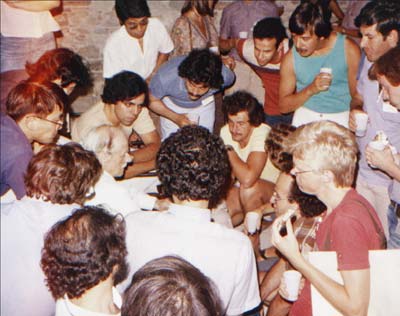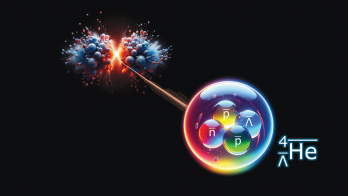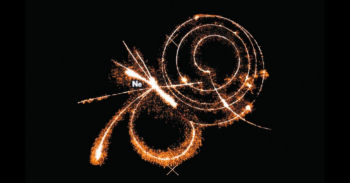As Dirac realized, there’s more to antimatter than antihydrogen.

“Those who say that antihydrogen is antimatter should realize that we are not made of hydrogen and we drink water, not liquid hydrogen.” These are words spoken by Paul Dirac to physicists gathered around him after his lecture “My life as a Physicist” at the Ettore Majorana Foundation and Centre for Scientific Culture in Erice in 1981 – 53 years after he had, with a single equation, opened new horizons to human knowledge. To obtain water, hydrogen is, of course, not sufficient; oxygen with a nucleus of eight protons and eight neutrons is also needed. Hydrogen is the only element in the Periodic Table to consist of two charged particles (the electron and the proton) without any role being played by the nuclear forces. These two particles need only electromagnetic glue (the photon) to form the hydrogen atom. The antihydrogen atom needs two antiparticles (antiproton and antielectron) plus electromagnetic antiglue (antiphoton). Quantum electrodynamics (QED) dictates that the photon and the antiphoton are both eigenstates of the C-operator (see later) and therefore electromagnetic antiglue must exist and act like electromagnetic glue.
If matter were made with hydrogen, the existence of antimatter would be assured by the existence of the two antiparticles (antiproton and antielectron), the existence of the antiphoton being assured by QED. As Dirac emphasized, to have matter it is necessary to have another particle (the neutron) and another glue (the nuclear glue) to allow protons and neutrons to stay together in a nucleus. This problem first comes into play in heavy hydrogen, which has a nucleus – the deuteron – made of one proton and one neutron. For these two particles to remain together there needs to be some sort of “nuclear glue”. We have no fundamental theory (like QED) to prove that the nuclear antiglue must exist and act like the nuclear glue. It can be experimentally established, however, by looking at the existence of the first example of nuclear antimatter: the antideuteron, made with an antiproton, an antineutron and nuclear antiglue. If the antideuteron exists, all other antielements beyond heavy antihydrogen must exist. Their nuclei must contain antiprotons, antineutrons and nuclear antiglue. But if the antideuteron did not exist, nothing but light antihydrogen could exist: farewell anti-water and farewell all forms of antimatter.
Dirac’s statement takes into consideration half a century of theoretical and experimental discoveries, which have ultimately concluded that the existence of antimatter is supported exclusively by experiment. The CPT theorem implies that if matter exists then so should antimatter, but T D Lee has shown that the theorem is invalid at the Planck scale (around 1019 GeV) where all of nature’s fundamental forces converge (Lee 1995). Because this grand unification is the source of everything, if CPT collapses at the energy scale where it occurs, then we can bid farewell to all that derives from CPT.
CPT and the existence of antimatter
The CPT theorem states that physical laws are invariant under simultaneous transformations that involve inversions of charge (C), parity (P) and time (T). The first of these invariance operators to be discovered was C, by Hermann Weyl in 1931. This says that physical reality remains invariable if we replace the charges that are additively conserved by their corresponding anticharges – the first known example being that of the electron and the antielectron. The P operator, discovered by Eugene Wigner, Gian-Carlo Wick and Arthur Wightman, tells us that in replacing right-handed systems with left-handed ones, the results of any fundamental experiment will not change. The T operator, discovered by Wigner, Julian Schwinger and John Bell, established that inverting the time axis will also not alter physical reality.
The mathematical formulation of relativistic quantum-field theory (RQFT), which is supposed to be the basic description of nature’s fundamental forces, possesses the property of CPT invariance whereby inverting all does not change the physical results. In other words, if we invert all charges using C, the three space reference axes (x, y, z) using P, and the time axis using T, all will remain as before. However, matter is made of masses coupled to quantum numbers that are additively conserved: electric charges, lepton numbers, baryon numbers, “flavour” charges etc. If we were to apply the three CPT operators to matter in a certain state we would obtain an antimatter state. This means that if the CPT theorem is valid then the existence of matter implies the existence of antimatter and that the mass of a piece of matter must be identical to that of the corresponding piece of antimatter.
Suppose that nature obeys the C invariance law; in this case, the existence of matter implies the existence of antimatter. If C invariance is broken, the existence of antimatter is guaranteed by CPT. Now, suppose that CP is valid; again, the existence of matter dictates the existence of antimatter. If CP is not valid, then the existence of antimatter is still guaranteed by CPT. If CPT collapses, however, only experimental physics can guarantee the existence of antimatter. This summarizes what effectively happened during the decades after Dirac’s famous equation of 1928 – until we finally understood that CPT is not an impervious bulwark governing all of the fundamental forces of nature.
Three years after Dirac came up with his equation, Weyl discovered C and it was thought at the time that the existence of the antielectron and the production of electron–antielectron pairs were the consequences of C invariance. The equality of the mean life of positive and negative muons was also thought to be an unavoidable consequence of the validity of C. These ideas continued with the discoveries of the antiproton, the antineutron and, finally, of the neutral strange meson called θ2. This apparent triumph of the invariance operators came in parallel with the success in identifying a “point-like” mathematical formulation that was capable of describing the fundamental forces of nature. Building on the four Maxwell equations the marvellous construction of RQFT was finally achieved. This theory should have been able to describe not only the electromagnetic force (from which it was derived) but also the weak force and the nuclear force. Two great achievements reinforced these convictions: Enrico Fermi’s mathematical formulation of the weak force and Hideki Yukawa’s triumphant discovery of the “nuclear glue” – the famous π meson – thanks to Cesare Lattes, Hugh Muirhead, Giuseppe Occhialini and Cecil Powell (CERN Courier September 2007 p43).
These initial extraordinary successes were, however, later confronted with enormous difficulties. In QED, there were the so-called “Landau poles” and the conclusion that the fundamental “bare” electric charge had to be zero; for the weak forces, unitarity fell apart at an energy of 300 GeV; and in the realm of the nuclear force, the enormous proliferation of baryons and mesons was totally beyond understanding in terms of RQFT. This is when a different mathematical formulation, the “scattering matrix” or S-matrix, was brought in, and with it the total negation of the “field” concept. It required three conditions: analyticity, unitarity and crossing. So, why bother with RQFT if the S-matrix is enough? On the other hand, if RQFT does not exist, how do we cope with the existence of CPT invariance? This opened the field related to the breaking of the invariance laws, C, P, T.
The shock of CP violation

In 1953 Dick Dalitz discovered the famous θ–τpuzzle: two mesons, with identical properties, had to be of opposite parity. Intrigued by this “puzzle”, T D Lee and C N Yang analysed experimental results in 1956 and found that there was no proof confirming the validity of C and P in weak interactions. Within one year of their findings, Chien-Sung Wu and her collaborators discovered that the invariance laws of C and P are violated in weak interactions. So how could we cope with the existence of antimatter? This is why Lev Landau proposed in 1957 that if both the C and P operators are violated then their product, CP, may be conserved; the existence of antimatter is then guaranteed by the validity of CP (Landau 1957).
There is one small detail that was always overlooked. In 1957, in a paper that not many had read (or understood), Lee, Reinhard Oehme and Yang demonstrated that, contrary to what had been said and repeated, the existence of the two neutral strange mesons, θ1 and θ2, was not a proof of the validity of C or P, or of their product CP (Lee, Oehme and Yang 1957).
I was in Dubna in 1964 when Jim Cronin presented the results on CP violation that he had obtained together with Val Fitch, James Christenson and René Turley. On my right I had Bruno Touschek and on my left Bruno Pontecorvo. Both said to me of Cronin and his colleagues, “they have ruined their reputation”. The validity of Landau’s proposal of CP invariance, with antimatter as the mirror image of matter, was highly attractive; to put it in doubt found very few supporters. Dirac, however, was one of the latter and he fell into a spell of deep “scientific depression”. He, who was well known for his caution, had total belief in C invariance, which had led him to predict the existence of antiparticles, antimatter, antistars and antigalaxies. Now even CP was breaking.
If the CPT product is to remain conserved, the breaking of CP involves that of T. For some of the founding fathers of modern physics, however, invariance relative to time inversion at the level of the fundamental laws had to remain untouched. So, if CP breaks and T does not, then CPT must break. After all, why not? In fact, the bulwark of CPT was RQFT, but it already seemed as if this mathematical formulation had to be replaced by the S-matrix. The breaking of the invariance operators (C, P, CP) and the apparent triumph of the S-matrix were coupled at the time to experimental results that indicated no trace of antideuterons, even among the production of 10 million pions in proton collisions.
To obtain the first example of antimatter it seemed that CPT had to be proved right, which meant proving the violation of T. No one back in 1964 could imagine that physics would open the new horizons that we know today. The only actions left to us then were of a technological–experimental nature. It turned out that the discovery of true antimatter required the realization of the most powerful beam of negative particles at CERN’s PS, as well as the invention of a new technology capable of measuring, with a precision never achieved before, the time-of-flight of charged particles. This is how we came to discover an antideuteron produced, not after 10 million pions, but only after a 100 million (Massam et al. 1965).
The crucial experiment
The search for the existence of the first example of nuclear antimatter needed a high-intensity beam of negative particles produced in high-energy interactions. This negative beam was dominated by pions, with a fraction of K mesons and a few antiprotons. It was necessary to separate particles with different masses, starting with pions and then going up with mass to K mesons, antiprotons and (it was hoped) antideuterons. To accomplish this the first step was a combined system of bending magnets coupled with magnetic quadrupoles – for focusing purposes – and a strong electrostatic separator. This high-intensity beam of negative “partially separated” particles was the result of a special project made and carried out with two friends of mine, Mario Morpurgo and Guido Petrucci. The second vital step was a sophisticated time-of-flight system capable of achieving the time resolution needed to detect one negative particle (the antideuteron) in a background of a 100 million other negative particles (essentially, π mesons). The results, which showed the existence of a negative particle with mass equal to that of the deuteron, were obtained on 11 March 1965, the same day as the 41st birthday of the PS director, Peter Standley.
Dirac came out of his depression when he received a phone call from his friend Abdus Salam, saying: “Relax Paul, my friend Nino Zichichi has discovered the antideuteron”. Dirac called me and invited me for lunch at his place, and this started a friendship that led us to the realization of the Erice Seminars on Nuclear Wars.
To understand the importance of this discovery we need to have a clear idea of what is meant by “matter”. Particles are not sufficient to constitute matter; we also need “glues”. With electromagnetic glue we can make atoms and molecules; to make the nucleus, we need protons, neutrons and nuclear glue. To make antimatter requires antiprotons, antineutrons and nuclear “antiglue”; but we also need to know that nuclear antiglue allows these constituents of antimatter to stick together just as protons and neutrons do to form matter. A fundamental law is needed that establishes the existence of nuclear antiglue that is exactly identical to the nuclear glue in matter. This fundamental law is missing.
In fact, we know today that the strengths of all of the fundamental forces converge at the Planck energy, where CPT invariance breaks down. Moreover, if we replace the “points” with “strings”, nothing changes. CPT results from the “point-like” mathematical formulation of RQFT but it collapses at the energy scale at which the fundamental forces originate, i.e. at the Planck energy. If we replace “points” with “strings” then relativistic quantum string theory results; but it cannot validate CPT. This implies that no theory exists that can guarantee that if we have matter then antimatter must exist. This is why the fact that all anti-atoms with their antinuclei must exist with certitude resulted from the experiment at CERN in March 1965.
In 1995, during his opening lecture for the symposium celebrating the 30th Anniversary of the Discovery of Antimatter in Bologna, T D Lee said: “Werner Heisenberg discovered quantum mechanics in 1925 and by 1972 he had witnessed almost all of the big jumps in modern physics. Yet he ranked the discovery of antimatter as the biggest jump of all. In fact in his book The Physicist’s Conception of Nature (1972), Heisenberg writes, ‘I think that this discovery of antimatter was perhaps the biggest jump of all big jumps in physics in our century.’.”
• This article is based on the opening talk given at the event to celebrate the 50th anniversary of the Karlsruhe Nuclide Chart, held in Karlsruhe on 9 December 2008 (see www.nucleonica.net:81/wiki/index.php/Help:Karlsruhe_Nuclide_Chart). For the full article with complete references, see www.nucleonica.net:81/wiki/images/a/aa/05_Zichichi_Karlsruhe.pdf.







